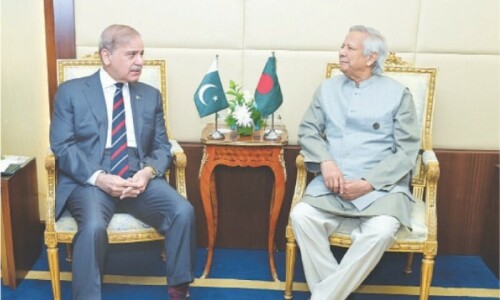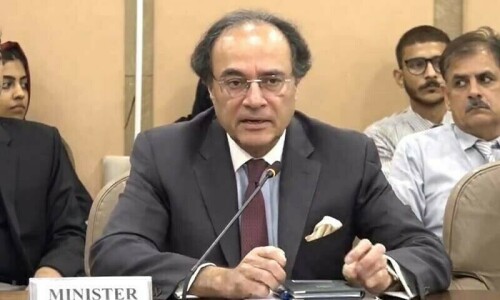“We’re like two limping camels,” says Sana as we meet in their bridal studio, which would be completely cloaked by neighboring town houses if it weren’t for the number of cars parked outside their gate between 11-1pm. Two hours is all they spend with brides; the rest of the day is spent, in what they refer to as “slaving” over designs, inventory, merchandising and accounts at the manufacturing units. Running a retail business, as opposed to a private studio, is demanding, and with three stores already up and running, a fourth (in Islamabad) launching in December, they are feeling the heat.
Almost 25 years in the fashion business with couture, bridals, furniture, lawn and now ready to wear retail to your name. What’s been the biggest challenge?
Sana: We’ve never faced a challenge like we have with retail. The challenge being to start a new business at this age, finding professional management and dealing with the kind of turnover that one needs to see in retail. Our issue right now is that in this country with this massive population we still can’t find the right people. We’ve never been this exhausted.
Do you regret stepping into high street operations?
Sana: Retail and opening stores is the most challenging and money-absorbing thing we’ve ever done. You need to have very lucrative business behind you to be able to pour that money into retail. And a lot of designers have opened one or two stores but it’s very difficult to open a chain. It’s just too costly. You have to have a lot of venture capital coming into the business. Before you make money you have to spend a lot. And that’s why most people choose not to. But there are no regrets. Not yet.
Safinaz: In retail, it’s by the third year that you know whether you’re sinking or whether you’re going to ease out and we’ve just been open four months. We’re not panicking yet.
When it comes to design, what are the limitations you work with?
Safinaz: The restraints are purely cultural. Sleeveless is a huge issue, forget spaghetti straps. Then there is the back issue; nobody wants a low back. Girls have finally gotten around to showing a little bit of ankle and we’ve been trying to get them to wear shorter shirts in the day. But apart from that, the conservative nature is very strong and I don’t think that is going to change. The dupatta is always going to be around. Women will cover themselves when they go out, even if it’s with that flimsy chiffon dupatta.
When I say ‘most’ women I’m talking 90 per cent. There are only three to four girls who will wear fashion as we see it and they’ll be featured in magazines but that’s not your mainstream. So if you’re talking about mainstream fashion, then nothing has changed. And that’s the biggest limitation when we sit down to design.
Don’t designers like to believe that fashion is evolving, changing?
Safinaz: Fashion has become more colourful and more playful, but not in terms of style. Necklines and colours can change, we can introduce prints and play around with the sleeves or the front and back of a shirt. But as far as the construction of the garment goes, there is very little you can do. When it comes to the balance between conservatism and being a little risqué, women are not going to change the way they dress. We have to concede to that fact.
Our traditions are so strong that they dictate fashion. Red is standard for shaadis. We shifted the trend to magenta but it took ages for women to accept it. Evolution is slow. This is the first time in 23 years that we’ve done three black wedding ensembles!
Speaking of bridals, this is the first time you’ve shown at the PFDC L’Oreal Paris Bridal Week. You’ve also shown at every other fashion week in Pakistan. Do you feel they are building necessary bridges with business?
Sana: Yes, now they are. With fashion weeks your name comes up so frequently that it pushes retail. A particular dress you see on the catwalk may not look wearable but that print will transmit into lawn, pret and you’ll see different versions of it. Nothing we design goes to waste. All of the prints we make for the shows are used in the shops. They’re all converted within the six-month lead period. You’ll get watered down versions of what you saw on the runway but you’ll get everything.
People may ask who’s going to wear the dresses but even dresses end up on a red carpet. There’s a demand for a red carpet outfit almost every day and you see everyone’s collection come out in the press. It may not be bought out but celebrities are wearing it.
Are celebrities now buying clothes for red carpet appearances or are they still borrowing and returning?
Safinaz: All of them are still borrowing and returning. And I tend to disagree with Sana on the value of fashion weeks. I don’t think fashion weeks are generating any business. What they’re doing is generating publicity and creating recognition.
You were always low profile until you started lawn and you’re a lot more accessible now that you have stores. Do you feel more open to criticism now that you’re in retail?
Safinaz: We only want to hear the criticism.
How do you deal with women complaining of the quality of your product: the fabric or colour runs?
Safinaz: We take all criticism very positively and try to fix whatever is wrong with our product. We will make mistakes and we are more than willing to listen. It’s a work in progress. We’re learning on the job.
Sana: I am wearing my own product right now. I wear it regularly and since I have only four shalwar kameezes, it’s been washed a hundred times. The quality speaks for itself. Of course, there will be a batch with a colour run but we have a call-back policy. You take our product home, you don’t like it, you can come in and exchange it. You have two weeks to get your money back.
Safinaz: When it comes to fabric quality I beg to differ. We use superior quality fabric. I can accept that there are quality and design issues but not fabric issues.
Sana: There was a lot of criticism when we started lawn. Women had issues with fabric and prints but we’ve turned out to be the superior product, which is why we sell out, year after year. You have to give us time.
Where does the council figure amidst all this business development?
Safinaz: It really doesn’t. The senior members are all exhausted.
What do you think is the purpose of having a fashion council?
Safinaz: The sole purpose of having a fashion council, as of now, is to have one head and for her worker bees to help put fashion week together. There were supposed to be other purposes — a fashion school, workshops — but nothing has worked out. The only thing is to put fashion week together. Lahore has a strong head, which is why Lahore has been successful.
Sana: And mind you, fashion week is good enough for now. Fashion week feeds a number of industries. It feeds content. Fashion weeks predict what fashion is going to be. They predict trends and impact so many livelihoods.
Do you think Karachi’s young council can create the kind of leadership that Lahore has?
Safinaz: First of all, the older designers are not leaving. We’re all around to offer any help the new board needs. But what they have (and we don’t) is energy. They have the drive to take the council forward. They’re at the growth stage whereas most of us have no time because we’re so involved in our businesses. Lahore’s always had youngsters but we had all oldies. Now is the time to give these kids a chance to bring in new ideas.
Sana: That said it’s terrible that they’re missing a (fashion week) season. That’s the stop and start of it. They shouldn’t have broken the cycle. Even if they had done a one-day show it was essential they do it, come out in the press and create a history that is permanent. We all have to be consistent now. Incompetence shouldn’t override consistency every time. People who are old, exhausted, unavailable should have back-ups. This young team should’ve been put in charge right after the last fashion week to ensure continuity.
What about several years of TDAP? Has the Trade Development Authority of Pakistan helped you in any way?
Sana: So far it hasn’t helped us at all but TDAP is trying to promote a value added product and it can work. Bangladesh has taken you over. If trade with India opens, brands like Gul Ahmed and Sana Safinaz would have massive markets. We already do so well in India because despite having a huge fashion industry, India has a specific design philosophy and nothing of theirs looks like us. Growth would double, triple if trade opened. So TDAP is doing the right thing by calling in the buyers and creating name recognition.
Safinaz: There needs to be more clarity. We have no idea of whom the buyers are or what they’re interested in. There was no feedback. Rabiya Javeri has managed to pull the show together but that’s all there is to it as of now.
(The interview was conducted a day before the TDAP show in Karachi)















































